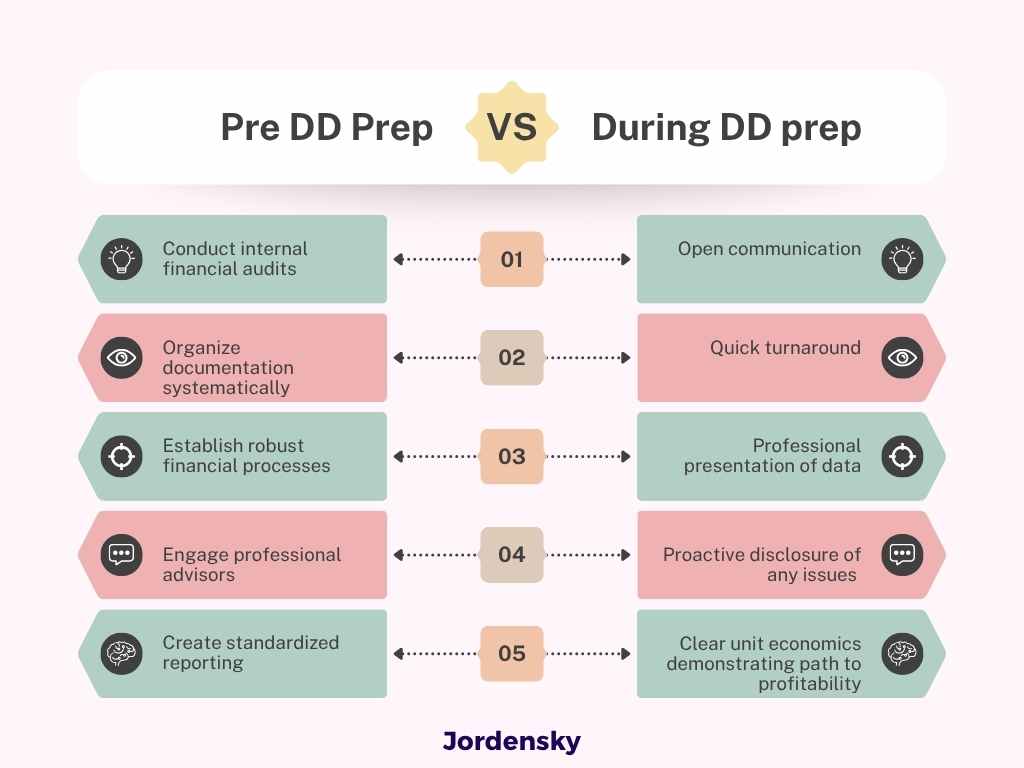Learn essential financial due diligence for startups including financial statements review, cash flow analysis, and compliance

When Byju's was preparing for its Series A funding round in 2013, the edtech startup spent months organizing financial documents and preparing for what would become one of the most scrutinized financial due diligence processes in Indian startup history. Fast forward to today, and that meticulous preparation played a crucial role in building investor confidence—eventually leading to Byju's becoming India's most valued edtech unicorn.
But here's the reality: 95% of startup funding deals encounter delays or fall through entirely due to inadequate financial due diligence preparation. For Indian entrepreneurs navigating the complex world of startup funding, understanding and mastering the financial due diligence process isn't just important—it's absolutely critical for survival and growth.
Whether you're a first-time founder in Bangalore's tech hub or a seasoned entrepreneur in Mumbai's financial district, this comprehensive guide will walk you through everything you need to know about financial due diligence for startups, helping you avoid common pitfalls and position your company for funding success.
Financial due diligence is essentially a comprehensive health check-up of your startup's finances. It's the process where potential investors conduct a thorough examination or audit prior to a transaction, meticulously reviewing every aspect of your company's financial health, from revenue streams to compliance records.
Think of it as a detective investigation where investors are trying to answer one fundamental question: "Is this startup worth our investment, and what risks are we taking?"
The process involves reviewing financial statements—including your income statement, balance sheet, and cash flow statement—along with conducting market analysis and inspecting legal documents. For Indian startups, this process has become increasingly sophisticated, with investors now demanding unprecedented levels of transparency and documentation.
India's startup ecosystem has matured dramatically over the past decade. With over 100 unicorns and counting, the days of informal funding based on relationships and gut feelings are largely behind us. Today's investors, whether domestic or international, conduct rigorous due diligence on startups that often takes 6-10 weeks for Series A rounds.
Consider the case of Zomato's IPO journey. The food delivery giant spent nearly two years preparing its financial documents and ensuring compliance with SEBI regulations. This meticulous preparation paid off when they successfully raised ₹9,375 crores in their public offering, largely because investors had complete confidence in their financial transparency.
When investors sit down to analyze your financial statements, they're looking for much more than just numbers. They're seeking patterns, trends, and insights that reveal the true health of your business.
Income Statement Analysis forms the backbone of this review. Investors meticulously examine:
Take the example of Flipkart's early funding rounds. Investors were initially concerned about the company's heavy losses, but the consistent revenue growth and improving unit economics in their income statements convinced investors like Tiger Global to continue backing the company.
Balance Sheet Review provides a snapshot of your company's financial position:
For Indian startups, balance sheet review also involves careful examination of RBI compliance for foreign investments and proper documentation of cross-border transactions.
Perhaps nothing matters more to investors than understanding how money flows through your business. The cash flow statement examination reveals:
Analyzing cash flow, burn rate, and funding history becomes particularly crucial for startups. Investors want to understand:
Paytm's journey provides an excellent example. During their pre-IPO preparations, investors closely scrutinized their cash flow patterns, particularly focusing on how the company's burn rate was decreasing while revenue was growing, indicating improving unit economics.
Evaluating key financial ratios helps investors understand your startup's performance relative to industry benchmarks:
For startups, investors also focus on startup-specific metrics:
Creating a comprehensive financial document package is like building a compelling story about your startup's journey. The key is organization and completeness.
Core Financial Documentation should include:
Supporting Documentation adds credibility and context:
Modern due diligence processes require sophisticated document management. Creating a secure digital data room demonstrates professionalism and makes the process efficient for all parties involved.
When Razorpay prepared for their Series D funding, they created a meticulously organized data room that impressed investors with its completeness and accessibility. This attention to detail contributed to their successful ₹1,000 crore funding round.
Your data room should include:
One of the most common reasons due diligence processes fail is inadequate documentation. Indian startups often struggle with:
Regulatory compliance in India's complex legal environment presents unique challenges:
The recent case of several Indian startups facing scrutiny over their employee stock option (ESOP) taxation highlights how compliance issues can derail funding processes.
Unrealistic financial projections often create valuation disputes during due diligence. Common issues include:

Successful due diligence preparation starts months before you begin fundraising:
Transparency and responsiveness are crucial during active due diligence:
Swiggy's Series I funding round in 2021 exemplifies excellent due diligence preparation. The food delivery giant had:
This preparation contributed to their successful $1.25 billion funding round, valuing the company at $10.7 billion.
Tech startups face specific due diligence challenges:
Manufacturing startups encounter different financial scrutiny:
Financial due diligence for startups is not just a hurdle to overcome—it's an opportunity to demonstrate the strength and maturity of your business. Companies that approach due diligence with thorough preparation, transparency, and professionalism significantly increase their chances of funding success.
As India's startup ecosystem continues to evolve, the standards for financial due diligence will only become more stringent. The startups that thrive will be those that embrace this reality and build robust financial processes from day one.
Remember, due diligence is not just about satisfying investors—it's about building a sustainable, scalable business that can weather the challenges of rapid growth and market volatility.
Q: How long does financial due diligence take for startups?
A: Typically 4-8 weeks for Series A rounds, though well-prepared startups can complete the process in 3-4 weeks.
Q: What are the most common red flags investors look for?
A: Inconsistent financial data, poor cash flow management, compliance issues, and unrealistic projections top the list.
Q: How much should startups budget for due diligence preparation?
A: Professional fees typically range from ₹2-10 lakhs depending on complexity, but the investment pays for itself through successful funding.
Q: Can startups conduct due diligence on themselves?
A: While internal reviews are valuable, professional external audits provide the credibility and objectivity investors expect.
Don't let inadequate financial due diligence preparation derail your funding dreams. The difference between startups that successfully raise capital and those that struggle often comes down to preparation, transparency, and professional financial management.
Ready to prepare your startup for investor-ready due diligence? Our team of experienced financial professionals specializes in helping Indian startups navigate the complex world of financial due diligence, ensuring you're prepared for whatever investors throw your way.
Schedule your complimentary financial health assessment today and discover how proper preparation can increase your funding success rate by over 300%. Contact us now to begin your journey toward successful fundraising and sustainable growth.
Don't wait until investors are knocking on your door—start preparing today and give your startup the financial foundation it deserves.